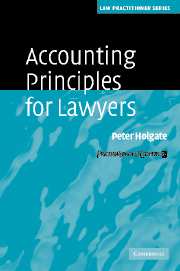Book contents
- Frontmatter
- Contents
- Acknowledgements
- Glossary of terms
- Part I The accounting environment
- Part II Some specifics
- 8 Individual entity accounts and consolidated accounts
- 9 Mergers and acquisitions
- 10 Interaction of accounting with tax
- 11 Assets
- 12 Liabilities
- 13 Leases
- 14 Pensions
- 15 Financial instruments, including capital instruments
- 16 Realised and distributable profits
- 17 Disclosures in published accounts
- 18 Use of financial information in contracts and agreements
- Appendices
- Index
9 - Mergers and acquisitions
from Part II - Some specifics
Published online by Cambridge University Press: 28 July 2009
- Frontmatter
- Contents
- Acknowledgements
- Glossary of terms
- Part I The accounting environment
- Part II Some specifics
- 8 Individual entity accounts and consolidated accounts
- 9 Mergers and acquisitions
- 10 Interaction of accounting with tax
- 11 Assets
- 12 Liabilities
- 13 Leases
- 14 Pensions
- 15 Financial instruments, including capital instruments
- 16 Realised and distributable profits
- 17 Disclosures in published accounts
- 18 Use of financial information in contracts and agreements
- Appendices
- Index
Summary
Introduction
Accounting for acquisitions and mergers has long been a controversial area of accounting. In particular there have been disputes about whether the technique of merger accounting should be permitted, and about the nature and accounting treatment of goodwill. The current UK rules are found in FRS 6 ‘Accounting for acquisitions and mergers’, FRS 7 ‘Fair values in acquisition accounting’ and FRS 10 ‘Accounting for goodwill and intangibles’. Recent changes in US accounting rules in this area have led to changes to IFRS (IFRS 3 ‘Business combinations’ was published in March 2004). Equivalent changes are likely to be made to UK standards, though the timescale for this is not clear. UK law sets out some details about acquisition and merger accounting.
Companies Act 1985 requirements
The detailed legal rules relating to accounting for acquisitions and mergers are set out in Schedule 4A to the Act. These apply to groups preparing accounts under UK GAAP but not to those preparing accounts under IFRS.
In particular, the Act requires that ‘An acquisition shall be accounted for by the acquisition method of accounting unless the conditions for accounting for it as a merger are met and the merger method of accounting is adopted.’ (Schedule 4A, para. 8). This is consistent with the requirements of FRS 6. If, in the future, merger accounting is banned, this legal requirement will be superfluous, though not wrong, as the conditions for merger accounting would never be met (see below).
- Type
- Chapter
- Information
- Accounting Principles for Lawyers , pp. 91 - 109Publisher: Cambridge University PressPrint publication year: 2006



